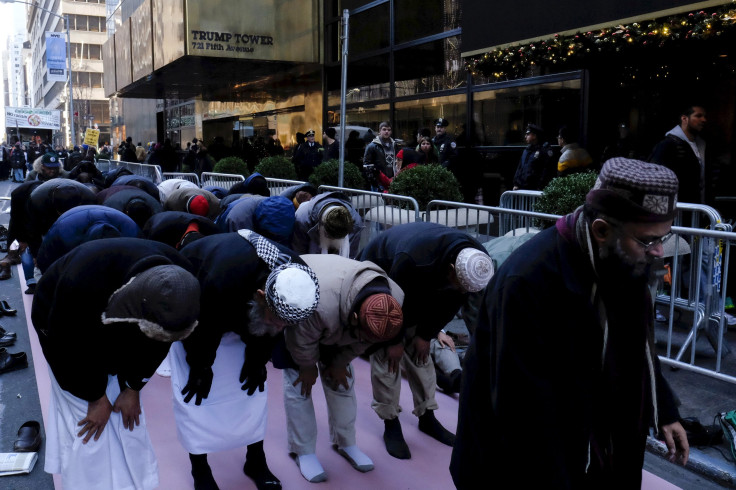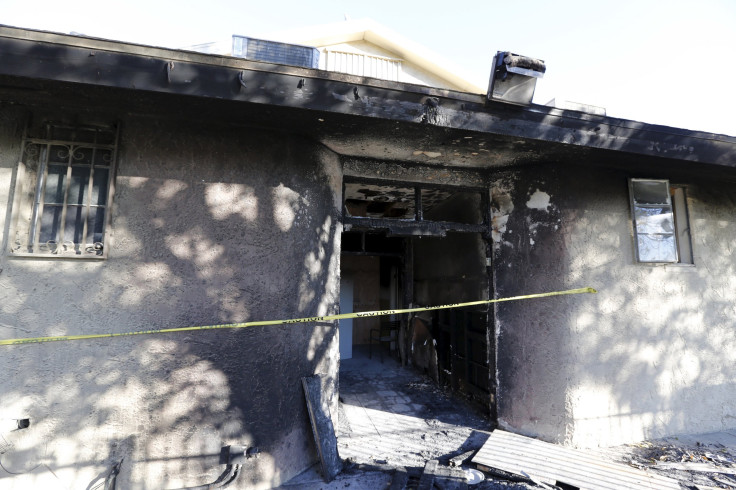Many Muslims Worried Donald Trump Will Win: Mosques Bolster Security After Wave Of Hate Crimes And Attacks

Imam Abu Sufian of the Madina Masjid mosque in New York City has witnessed first-hand the explosion in anti-Islamic violence that has unfolded during this divisive presidential election season. One of his fellow New York City Imams, a man he knew, was shot dead along with his associate as they walked home from morning prayer at a mosque in Queens in August. Another act of violence saw a sister from Sufian's mosque attacked by a car as she walked the streets of lower Manhattan earlier this year.
While much of the nation may hold its breath Tuesday as the identity of the next president of the United States becomes clear, perhaps no group will be watching with greater anxiety than American Muslims. Believing that Republican nominee Donald Trump has emboldened a frightening new wave of anti-Islamic sentiment and violence, Muslim leaders said they are worried about what may happen on election night -- and afterwards, even if Hillary Clinton wins.
“2016 is on track to be the worst year for anti-mosque violence recorded in the United States,” said Robert McCaw, director of government affairs at the Council on American-Islamic Relations. “This is a benchmark year for violence and acts of hatred against members of the Muslim community. I think when Trump has mainstreamed Islamophobia as acceptable public speech, that is going to embolden the bigots and racists inclined to commit acts of hate to do so.”
Trump has led increasingly heated political rhetoric targeting Muslims, including calling for a ban on all Muslims entering the country in the wake of several high-profile attacks, both in the U.S. and in Europe, by individuals professing extreme Islamic ideology.
At the same time, hate crimes against the Muslim community have reached heights not seen since the aftermath of the Sept. 11, 2001, terrorist attacks. Some believe the environment is now even more toxic.
“It’s worse than that,” said Sufian. “After Sept. 11, there was a mood of sadness, everyone was hurt by things, now it’s a planned way of bringing this hatred everywhere, there is clear division.”
Positioning himself as the man to safeguard the country against the threat of terrorism, Trump has repeatedly singled out Muslims as a threat to national security. As well as insisting that he would require all Muslims in the United States to register in a database, he has refused to rule out strict surveillance of Muslims and warrantless searches of mosques.
“We’re going to have to do things that we never did before,” he said in an interview with Yahoo News last November. “And some people are going to be upset about it, but I think that now everybody is feeling that security is going to rule.”
While many officials at mosques and Islamic groups across the country said they still hoped the Republican candidate would not follow through on those policies, others felt no choice to take him at his word.
“We trust that he’s going to do what he says he’s going to do,” Imam Talib M. Shareef of Washington D.C.’s Masjid Muhammad mosque said. “He’s going to make it very difficult for those who are trying to get citizenship, we trust that he’s going to try and survey neighborhoods where Muslims may be. There’s a constituency that is behind that agenda and they’re going to expect him to deliver.”
Shareef, whose mosque was threatened by armed protestors in February, said his mosque had recently been contacted by the FBI, as well as local law enforcement agencies, to consult on its security needs, with extra security set to be provided on the night of the election.
“The spike [in anti-Muslim attacks] has been due to this election year,” he said. “We know it’s directly related to it, so there is an expectation that the outcome will lead to more or it will begin to stabilize.”
Other Muslim officials described mosques being vandalized, pork left outside the doors, adults harassed by taunts of “terrorist, go home!” and children regularly being attacked at school.
In the case of the sister narrowly escaping being run down in New York, Sufian claims the driver in question made similar remarks, screaming "terrorist" and "go back to your country." And although hate-crime charges have not been brought against the man accused of killing the Imam and his associate in New York, the charge has been explored. The local Muslim community, meanwhile, has had no doubts about the motive, and has demanded the deaths be classified as a hate crime.

While Trump's comments have taken the spotlight, Clinton has also garnered criticism for talking of American Muslims solely in the context of national security.
"In this election cycle both presidential candidates to different degrees have truly securitized the relationship of Muslims as a community in this country," said McCaw. "Muslims are doctors, engineers, school teachers and service members. They have a lot to contribute to this country. When Muslims are only talked about as a national security threat or asset it takes away from the greater contributions of the community."
The growing number of hate crimes has motivated Muslims to exercise their voting rights. Polling from CAIR, the nation’s largest Muslim advocacy group, indicates that not only are Muslims more interested in casting their vote than ever before, but that the figures also top the national average across all demographics. Along with informal word-of-mouth efforts to encourage Muslims to exercise their democratic right, organizations have engaged in more structured campaigns. A group of Muslim organizations, including Masjid Muhammad in the nation’s capital, initiated a drive to get one million Muslims to register to vote. Earlier this week, the campaign was announced as a success.
Imam Dr. Zia ul Haque Sheikh of the Islamic Center of Irving in Texas, another mosque that was the target of armed protestors this year, said his center was considering providing transportation to take people to their local polling station.
Another prominent Muslim at the forefront of encouraging Muslims to get to the ballot box is Khizr Khan. The Muslim father of a soldier killed in Iraq, Khan spoke at the Democratic National Convention in July, after which Trump went on the attack, suggesting Khan's wife, who had been standing next to him on stage, was forbidden from speaking.
While Muslims make up just one percent of the U.S. population and the largest concentration is located in the safe Democratic state of New York, there are significant populations in swing states like Florida, Michigan, Ohio and Virginia. And Zia hinted that, while Trump’s comments about Muslims may have energized his base, they could ultimately cost him dear.
“Muslims are positioned in a number of swing states and across the country that tip very close elections,” he said.
For all of the security concerns, some Muslim officials express surprisingly positive feelings. They described non-Muslims showing solidarity and helping their community. Shareef, for example, recalled neighbors expressing outrage after his mosque was threatened by armed protestors.
"We’re located right in the heart of D.C., surrounded by neighborhoods, and they stood up and protected us and put flyers up to let the group know that this is a hate-free zone," Shareef said.
The sense of hope is also partly due to the belief that the political engagement awakened in this election cycle is here to stay. Muslim immigrants to the U.S. have now lived here for an average of 15 years, and with that has come an appreciation for American democracy and many of the rights they were denied in their country of origin, a CAIR report found.
Ultimately, despite the anxiety approaching election night, many still believe that the best in America will shine through.
“Don’t let this rhetoric of the election influence you in any way about what this great society is all about," said M.J. Khan, president of the Islamic Society of Greater Houston. "America has overcome lots more in the past and this, too, shall pass."
© Copyright IBTimes 2024. All rights reserved.











